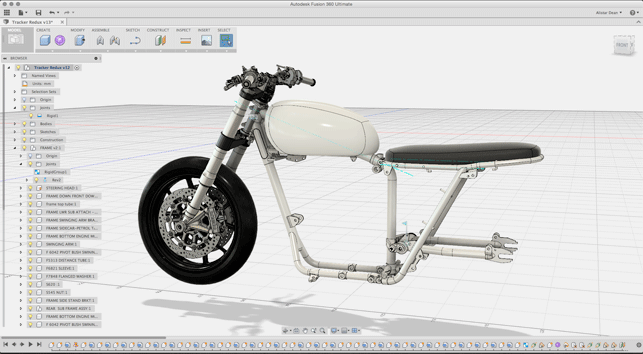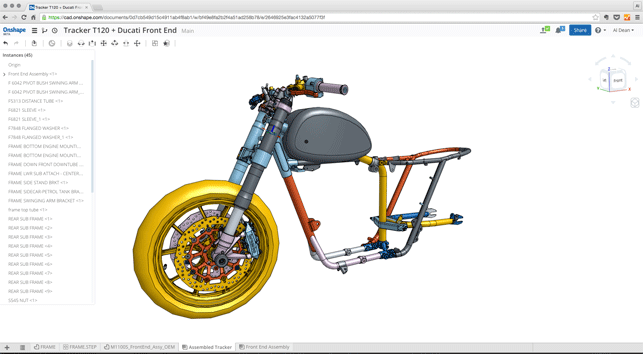There are big changes afoot in the 3D design market. Al Dean takes a look at the challenges that the cloud is trying to solve. It’s not just about your data being centralised; it’s something much more fundamental
The last few years have been building up to this pivotal point. Now that Onshape is out in the public, we’re going to see the 3D CAD market get a long overdue kick up the arse. It’s not even the fact that the SolidWorks founders got back together, it’s about a group of vendors trying something new, something that hasn’t been tried before.

When it comes to 3D design in the cloud, Autodesk was first out of the gate with Fusion
Despite some of the technical differences between Autodesk Fusion and Onshape, the former has been banging the cloud-enabled design tool drum for the last few years. Now we have two major players and therefore a market. Once Dassault Systèmes’ cloud and V6-based products start to get traction, we’ll have three.
I came to the realisation that the cloud was the future a little while ago. The traditional design and engineering software market is perhaps one of the last to hang on to the desktop software business model.
It is also hanging on to a pricing structure that simply doesn’t suit most design and engineering organisations anymore — and arguably never did.
To use traditional 3D design tools there’s a heavy upfront and considerable investment — and that’s not just about the software costs and on-going maintenance. In addition, there’s also the requirement for heavy duty workstation as well as servers for license management.
Then you get into the realms of data management (or indeed, lifecycle management). Costs at this stage can then start to ratchet up as you add in additional software, hardware, infrastructure and even consultancy — just to be able to use the software you’ve invested in.
Of course, software vendors could change this overnight with a shift in pricing, but if they have a stable business and customers are paying, they’ve no real impetus to disrupt it. It takes external influences to cause a rethink — which we now have.
New tools, new sales model
Cloud-based applications change this, but the manner in which they change it varies between vendors, but that will also change.
At present, we have Fusion offering that focusses on centralised data and collaboration via the cloud but which has a streamed (rather than an explicit installation process) local application that does much of the heavy calculation.
Dassault’s Mechanical Conceptual works in a similar vein, but doesn’t have the same local solve and calculation. It’s a streamed application, but through local application none the less.
Onshape differs in that everything is done by the cloud server — you’re working it remotely through a browser. No download of software, just streaming of graphics and user interaction. But don’t think that this is how things will be for ever.
Things will normalise
I’m sure we’ll see a slew of claims and counter claims from all the involved parties over the next few months. That’s par for the course, as wasteful of resources it is.
What’s key to remember is that things will settle and this new set of applications will all start to normalise and we’ll have similar working methods from all the vendors — it’s what happened when we shifted from UNIX to Windows and it’ll happen again. Each vendor will try their own approach, each will experiment and each will learn through their own and other’s experience.
Eventually, Fusion will be available via the browser (I’d put a fiver on that being before the end of the year). DS’ next generation SolidWorks products will get better and more accessible. Though strangely, this is the unknown in the calculations as DS is reluctant to talk about the whole thing, presumably to protect its dominance with SolidWorks.
And hopefully, OnShape will have a way of working when you’re offline, as well as internet connected. Finally, I’d hope that DS is much more open about getting its customer’s access to the tools it is developing . The excuse that “They’re using our resources so they should pay” simply won’t cut it as these tools need to be played with, discovered and explored. At the moment, they’re not getting the exposure that they deserve — leaving a whole new market open to Autodesk and Onshape.

Onshape’s launch this month will kick start a new chapter in 3D design tool, not because it’s first, but because two players means that there’s competition and a market
A sterling idea
Also, for those of us on the right hand side of the Atlantic, there’s an additional benefit that finally, after years of being told that the cost of ‘doing business’ was higher as a justification for over charging us, we’re also beginning to see parity of pricing in these systems as well, across international borders.
A bright future?
My final thoughts are these. We currently have three cloud-based 3D design products for the mainstream on the market. We have Onshape, the SolidWorks V6-based cloud tools from DS and Autodesk Fusion.
At present, these three tools differ in how they work, how they’re priced and what you can achieve with each because they’re all at different stages of development and maturity.
They aren’t for everyone at the moment. Many companies are adverse to cloud data storage.
That also, I’m convinced, will change. I believe that we need a generational shift at the top of the tree at the IT level for the cloud to take off in engineering and design. But for those that do adopt this way of working, there’s a lot to gain, both technically and organisationally.
The arrival of Onshape moves the 3D CAD market up a gear
Default






